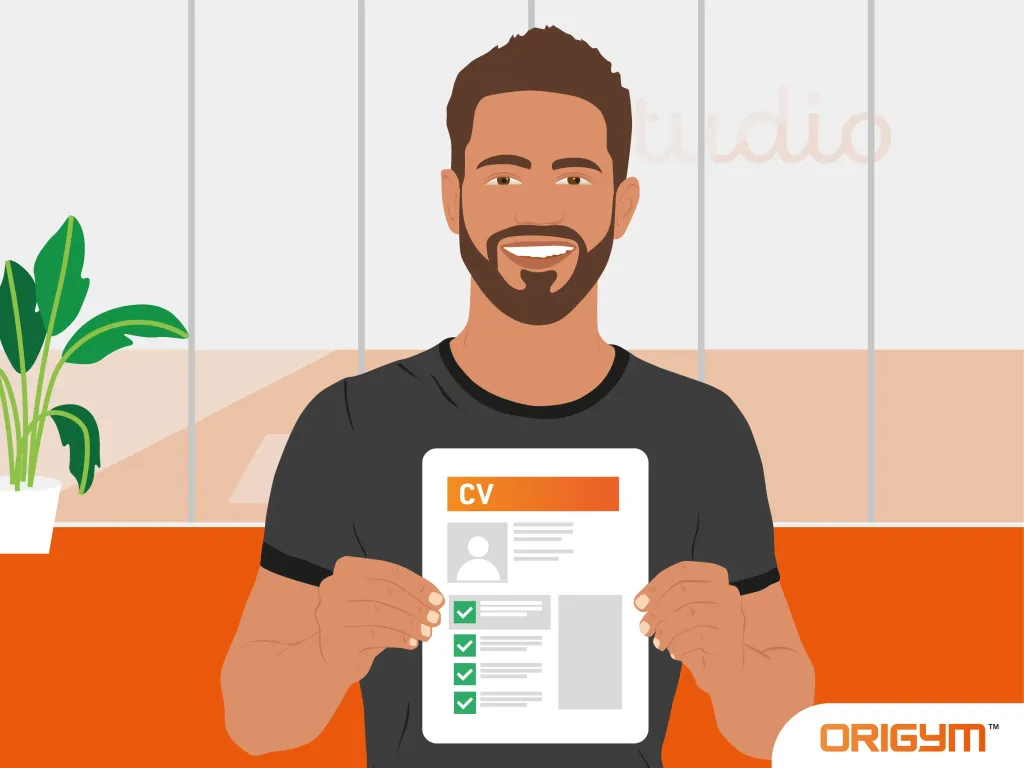
Many workers are turning away from traditional employment and choosing to be their own boss. In this article, we’ll explore a range of self employment ideas in various industries so you can find the right one for you.
Contents:
But if you want to get started with a career in health & fitness, our Personal Trainer Diploma allows you to get qualified in the fastest and most affordable way, allowing you to kickstart your self-employed career as soon as possible.
Why Is Self-Employment On The Rise?

According to Statista, as of January 2025, there were around 4.39 million self-employed workers in the United Kingdom.
There are various reasons for this rising stat, one of the main reasons people cite is wanting more control and flexibility. The ease and availability of using online platforms, and for simply wanting greater job satisfaction.
Another reason for the rise of self-employment is the impact of COVID and the increase of remote working as a result of the pandemic.
Let’s breakdown some of the pros and cons of being self-employed:
Pros of Being Your Own Boss:
- More control over your life and schedule.
- Flexible working hours.
- Open-ended progression.
- No micromanaging.
Cons to Consider:
- No workplace benefits.
- In charge of your own accountability.
- You may be more likely to experience loneliness.
Top 50 Self-Employment Ideas in the UK
We’ve got a range of self employment ideas below to help inspire your next career move, listing everything from freelance and online business, to fitness and creative ventures.
Fitness and Wellbeing Business Ideas
#1 – Personal Trainer

First on our list of self employed job ideas is to become a personal trainer. As a PT, you will deliver 1-on-1 sessions and create tailored fitness programmes to help clients achieve their health and fitness goals.
While personal trainers are often employed by gyms and fitness studios, many work freelance or are self employed.
Personal training as a career offers a lot of flexibility as you can choose to train clients either in person, online, or combine both of these services. You can even be a mobile personal trainer and train clients in their own homes.
To get started, you will need to complete personal training courses, specifically a Level 2 Gym Instructor and Level 3 Personal Trainer. With OriGym, you can enrol on a Personal Trainer Diploma, allowing you to get qualified in the quickest and most affordable way.
#2 – Online Fitness Coach
The next fitness self employed business idea is to become an online fitness coach. In this role, you will work virtually, creating wellness plans for clients revolving around physical, mental and nutritional health.
Similar to a PT, you will assess clients and design workouts but this will be entirely online. This can either be done by conducting live training sessions through video chat or providing prerecorded videos and workout programmes for clients to follow in their own time.
Again, you will need to enrol on a Level 2 Gym Instructor and Level 3 Personal Trainer qualification to work as a self employed online fitness coach. These qualifications are required for you to become a legitimate fitness coach, even if you’re starting your own online service.
#3 – Yoga Instructor

If you want other active self employed business ideas, you could Become a Yoga Instructor
Although yoga and pilates are similar, their focuses are different. In both roles, you will plan and deliver classes, instructing sessions either 1-on-1 or in groups.
Yoga sequences are more focused on balance, flexibility, and breath work. There are a range of styles and variations to explore, from the likes of Hatha, Vinyasa, Hot, the list goes on!
Similar to personal training, you can take the role of a yoga instructor online. In this instance, you could:
- Host private classes through platforms such as Zoom
- Sell prerecorded sessions
- Start a YouTube channel to showcase your work
To work in this position, you’ll need to complete a Level 3 Diploma in Yoga Teaching Course.
#4 – Acupuncturist
The role of an acupuncturist is to stimulate the nervous system and promote healing by inserting thin needles into specific points in the body. This involves assessing clients, developing treatment plans, and using needling techniques to address physical and emotional imbalances.
You’ll first need to complete accredited training to become a self-employed acupuncturist. This is typically a degree course or diploma that includes practical and theoretical components. You’ll also need to register with the British Acupuncture Council (BAcC) after qualifying.
As a self-employed acupuncturist, you can rent space in a clinic, work from home, perform mobile home visits or open your own clinic.
To start out in this career, you can network with local wellness professionals. It’s important you set up a website so clients can find your service easily. Building word-of-mouth referrals is also key to growing your client base.
#5 – Fitness Influencing
With the dominance of social media, many in the fitness industry have taken to building professional online profiles.
The role of a fitness influencer is to use social media to create and share content surrounding fitness, health, and wellness. This content can be focused on topics such as:
- Workout tips
- Using gym equipment
- Product reviews
- Promoting your own business e.g. example personal training
As long as you have a phone and access to social media, you can create a fitness profile and build up your following! You can then reach out to clients who engage with your content and offer your services.
While you don’t need specific qualifications for this, many fitness influencers are qualified fitness instructors, personal trainers, and nutritionists. Having personal training qualifications increases your credibility and strengthens trust with your audience.
Find out more about gaining clients through social media with our article: How to Start a Fitness Instagram.
#6 – Nutrition Coach

If you want to help people with their lifestyles and health, you may choose to become a nutrition coach. This role involves providing advice, guidance, and creating meal plans for clients looking
to improve their dietary habits and achieve their desired goals.
As a nutrition coach, you can set your business up online creating and selling custom tailored to your clients specificities. Alternatively, you could sell general pre-made plans that are suitable for popular goals such as weight loss.
To become a nutrition coach, you should complete a Level 4 Sports Nutrition Course. This will qualify you to offer nutrition advice and guidance to a range of clients. It will also equip you with the skills needed to write effective meal plans.
#7 – Physiotherapist

Physiotherapists help people recover from injuries, manage pain, improve mobility, and help prevent future physical issues. The role involves:
- Creating exercise programmes
- Delivering hands-on therapy
- Educating patients on movement, and advising on rehabilitation.
You can work in a range of areas as a self-employed physiotherapist, including opening your own private practice, visiting patients at home with a mobile service, or working freelance with sports teams, care homes, or gyms.
A university degree is typically required to work as a physiotherapist which usually takes three years to complete. Once qualified, you will then need to register with the Health and Care Professions Council (HCPC) to practice.
#8 – Sports Massage Therapist

Next on our list of self employed job ideas is the role of a sports massage therapist. This involves reducing muscle tension, treating soft tissue injuries, supporting recovery for athletes and active people, and improving flexibility.
These massage treatments are often delivered to help prevent injuries and improve a client’s athletic performance.
The self-employed options for sports massage therapists are similar to physiotherapists. You can choose to open your own private practice by setting up your own treatment room or clinic.
You could even open a mobile sports massage service and travel to your clients. Some SMT specialists even go on to work with professional sporting teams and athletes working at the very peak of their industry.
To become a sports massage therapist, you will need to complete a Level 3 Diploma in Sports Massage as a minimum requirement. To advance your skills and career further, you can then choose to study a Level 4 Diploma in Sports Massage.
Freelancing and Online Business Ideas
#9 – Freelance Writer
To start off our section of online and freelance self employed job ideas, we have fitness writing. In this role, you will create content about exercise, health, nutrition, and wellness.
This position can involve freelance writing for popular magazines, blogs, fitness brands and websites.
You can even develop your own blog, YouTube channel, and social media profiles. There’s also the option for ghostwriting where you can write material for influencers or companies under their name.
While qualifications aren’t required, completing health and fitness courses allows you to develop your knowledge and build trust with readers. You should create a portfolio to show off your work as this is likely to be required if you pitch articles to fitness blogs, magazines, and websites.
There’s also the option to join freelance platforms such as Upwork and Fiverr to find writing opportunities.
#10 – Social Media Manager

Social media managers create, schedule, and manage content for brands on social media platforms such as Instagram, Facebook, LinkedIn, TikTok, and X (Twitter). In this role, you will typically:
- Create posts
- Shoot videos
- Engage with followers
- Create and run ads
All of which will help businesses grow their presence online.
To work as a self employed social media manager, you can offer freelance services, managing media accounts for small businesses, individuals, or startups. This can also be done through consulting, as you can help companies improve their social media without dealing with their day-to-day posts.
To find clients, you can use platforms such as Upwork or Fiverrr and also social media like LinkedIn or Instagram. You can then network with small businesses, personal brands, and agencies.
#11 – Virtual Assistant
Next on our list of self employment ideas is a virtual assistant. In this role, you will provide remote support to businesses, busy individuals, and entrepreneurs.
Your tasks could include scheduling appointments, managing emails and social media, bookkeeping, and customer service. However, this can vary depending on who you’re working for as well as your existing skills.
Get started by networking on platforms such as LinkedIn or Facebook groups. Through social media, you can reach out directly to entrepreneurs or small businesses that need help with managing.
#12 – Web Developer

The job of a web developer is to design, build, and maintain websites or web applications. This can involve coding the front-end which is what users see or the back-end, which is behind the scenes. They may also improve site performance, fix bugs, and work with clients to meet their business needs.
As a self-employed web developer you can work freelance, building websites for businesses or individual clients. However, you can also work short-term for agencies or create and sell your own themes, templates, or plugins.
To get started, you’ll need to learn the necessary skills including HTML, CSS, JavaScript, and also back-end languages like PHP, Python, or Node.js. Knowledge of frameworks like React, Vue, Django and platforms such as WordPress or Shopify is also an advantage.
Use freelance platforms like Upwork, Fiverr, and Toptal and professional networks such as LinkedIn, Twitter/X, and local business groups to find clients. Contact small businesses with outdated or no websites. You should also build your own website to showcase your portfolio and services.
#13 – SEO Consultant
An SEO (Search Engine Optimisation) consultant helps websites rank higher on search engines like Google. This involves:
- Analysing current site performance
- Researching keywords
- Improving structure and content
- Building backlinks
- Advising on technical SEO
tools like Google Analytics, Search Console, Ahrefs, or SEMrush will be vital for performing each of these tasks. Free and paid courses such as Google’s SEO Fundamentals, Moz, or Yoast Academy are also beneficial for those looking to break into the industry.
You can then get started by providing freelance SEO services by offering audits, ongoing SEO management, or one-off optimisation projects. Use freelance platforms like Upwork, Fiverr, and PeoplePerHour. You can also network on LinkedIn, in business Facebook groups, or with web designers and marketing agencies.
Pitch to small businesses, bloggers, or e-commerce brands needing better online visibility.
#14 – Online Tutor

An online tutor teaches students remotely, helping them understand subjects like maths, English, science, languages, or even skills like coding or music. The work includes planning lessons, delivering one-to-one or group sessions over video calls, tracking progress, and sometimes preparing students for exams or certifications.
You can offer private 1-on-1 tutoring or for small group settings. There are also tutor platforms where you can list your services such as on Tutorful, Preply, Wyzant, or Superprof. You can tutor for more specialised tutoring such as exam preparation for GCSEs, SATs, or IELTS, degrees, or adult learning.
As an online tutor you should register as self-employed. Build a simple website or professional profile on tutoring marketplaces and collect testimonials as soon as possible to build credibility. To find students, use tutoring platforms, advertise in local Facebook groups, post on LinkedIn, or collaborate with schools/education centres.
While there is a focus on fitness, our Teaching and Assessing Course is a great way to gain experience in sharing knowledge and helping others learn. The teaching skills you’ll develop can then be transferred to others area you choose to tutor.
#15 – Graphic Designer

A graphic designer creates visual content for individuals or businesses. This can include designing logos, brochures, websites, social media graphics, advertisements, and packaging.
The role involves using design software like Adobe Photoshop, Illustrator, or Canva, and ensuring designs are visually appealing and effective
Many graphic designers are freelance and work on projects for clients from small businesses to larger companies. You should also focus on a niche like branding, web design, packaging design, or print design. Another option is to create templates, fonts, icons, or other digital assets to sell on platforms like Etsy, Creative Market, or Gumroad.
Use platforms like Upwork, Fiverr, and 99designs to find initial clients. You can network with small businesses, agencies, and individuals who may need design work.
You could even market yourself on social media platforms like Instagram or LinkedIn to build further connections with industry professionals.
#16 – Grant Writer
A grant writer researches, writes, and submits proposals to secure funding for nonprofits, businesses, or individuals. The work involves understanding the goals of the organisation, aligning those with interests of the funders, writing compelling proposals, and meeting all submission requirements.
You should start by writing sample proposals or offer free work for nonprofits to build a portfolio. You can also network within the nonprofit and funding community.
Other ways to get started is to join grant writing job boards or freelance platforms like Upwork, Freelancer, and ProBlogger. Reach out to local nonprofits or small businesses who may need grant writing services.
Trade and Practical Services
#17 – Maintenance Services

A maintenance provider offers general repair and improvement services for homes and businesses. Tasks can include fixing leaky taps, painting, assembling furniture, installing shelves, electrical work, plumbing, and drywall repairs.
Many who offer maintenance services such as plumbing or electrical work have completed a Level 3 Advanced Apprenticeship with a company to learn the necessary skills.
If performing maintenance services on a construction site, you will need a Construction Skills Certification Scheme (CSCS) card. This is proof you have the appropriate training and qualifications for the job.
Once you’ve gained some experience you can also expand to home renovations or property maintenance for landlords.
To get started, you should register as self-employed and check if you need a specific license for certain services like electrical work or plumbing. You should then get the right insurance such as public liability insurance to protect against accidents or damages.
#18 – Domestic & Commercial Cleaning

Next on our list of self employed ideas is something pretty much anyone can do! Domestic and commercial cleaning involves maintaining cleanliness and hygiene in homes, offices, shops, and other buildings.
Tasks can include dusting, vacuuming, mopping floors, sanitising bathrooms and kitchens, emptying bins, deep cleaning appliances and sometimes specialised services like carpet or upholstery cleaning.
This can be either domestic cleaning at home or commercial cleaning for offices and businesses. You should decide on the type of cleaning you want to do, whether this is standard cleaning or deep cleaning.
This allows you to decide how much to charge. You can then market your service by creating simple flyers, a website, and social media pages. To find more clients, join local Facebook groups, post on community notice boards, and network with estate agents, landlords, and businesses.
You can also register on platforms like TaskRabbit, Handy, or local cleaning service directories.
#19 – Mobile Car Valeting
A mobile car valet service involves professionally cleaning and detailing vehicles at people’s homes, workplaces, or other locations.
Services typically range from basic exterior washing and interior vacuuming to full valets that include waxing, upholstery shampooing, and paint correction. You can offer quick cleans for everyday drivers, premium packages for car enthusiasts, or contract work for businesses with vehicle fleets.
To get started, you’ll need to register as self-employed, get public liability insurance, and invest in essential equipment such as a pressure washer, vacuum cleaner, cleaning chemicals, and a reliable transport vehicle. Next, set clear service packages and pricing, build a website and also a social media presence showcasing your work, and promote your services locally.
#20 – Painter & Decorator

Painters and decorators prepare and finish surfaces. The job involves tasks like sanding, filling, priming, painting walls and ceilings, wallpapering, and sometimes applying specialist finishes.
Work can be residential, commercial, or industrial. Some decorators specialise in interior work, while others offer exterior painting, restoration, or even decorative techniques like murals and textured finishes.
You’ll need to register as self-employed, get public liability insurance, and invest in quality tools and materials. You can offer services directly to homeowners, builders, landlords, or businesses, and find work through local advertising, word of mouth, or online platforms.
Building a strong portfolio with before-and-after photos, setting clear pricing, and delivering reliable, high-quality work are key steps to growing your business.
#21 – Locksmith
The role of a locksmith is to install, repair, and open locks on doors, windows, safes, and vehicles. The work often includes fitting new locks, cutting keys, helping people who are locked out, and upgrading security systems. Locksmiths may offer emergency call-out services, scheduled security upgrades, or specialist services like safe repairs or auto locksmithing.
To become a self-employed locksmith, you typically start by completing a locksmith training course and getting hands-on experience, either through employment or practice. You’ll need to register as self-employed, invest in specialist tools, and get public liability insurance.
You can offer your services directly to homeowners, businesses, landlords, and car owners, advertising locally or online. Building trust, offering 24/7 services, and getting strong customer reviews can help grow your reputation and client base quickly.
#22 – Electrician

An electrician installs, maintains, and repairs electrical systems in homes, businesses, and industrial settings. The job can involve wiring new builds, upgrading old systems, installing lighting and appliances, fitting security systems, and ensuring everything meets safety regulations.
To become a self-employed electrician, you’ll first need to complete formal training. This is typically through an apprenticeship, vocational course, or technical college. You can gain the necessary qualifications and certifications such as NVQ Level 3 and Part P certification in the UK.
After training, register as self-employed, get public liability insurance, and join a professional body if needed like NICEIC or NAPIT.
Building a customer base starts with local advertising, creating a professional online presence, and delivering reliable, high-quality work that earns referrals and repeat business.
#23 – Plumber

The role of a plumber is to install, maintain, and repair water systems, drainage, and sometimes gas appliances in homes, businesses, and industrial sites. The work can include fitting bathrooms and kitchens, fixing leaks, clearing blockages, installing boilers, and carrying out emergency repairs.
Plumbers may specialise in domestic work, commercial projects, or focus on areas like renewable heating systems or gas engineering.
To become a self-employed plumber, you’ll need to complete formal training, usually through an apprenticeship or vocational course, leading to qualifications like NVQ Level 2 or 3 in plumbing. This includes Gas Safe registration if working with gas.
Once trained, you’ll register as self-employed, get public liability insurance, and invest in a reliable set of tools and a work vehicle. You can build a client base through local advertising, online marketing, and by delivering reliable, high-quality service that encourages customer recommendations.
Retail and eCommerce Business Ideas
#24 – Dropshipping Store

To start our section on retail and eCommerce self employment ideas, why not open a dropshipping store?
A dropshipping shop sells products solely online. When a customer places an order, the seller purchases the item from a third-party supplier, who ships it directly to the customer. Your main responsibilities are setting up an online store, selecting the right products and suppliers, managing customer service, and marketing your business.
To start a dropshipping business, choose a platform like Shopify or Etsy, and connect it to a dropshipping supplier such as AliExpress, Oberlo, or Spocket. Register as self-employed, set up your store with quality product listings and branding, and plan how you’ll attract customers.
This is best done through social media marketing, SEO, or paid ads. Success in dropshipping comes from offering great customer service, testing different products, and constantly refining your store based on customer feedback and trends.
#25 – Handmade Crafts & Etsy Store
If you’re creative, the next self employed job idea on our list is to open your own Etsy store selling handmade crafts. You can sell jewelry, art, home decor, clothing, or personalised gifts. As a seller, you’ll design and make your items, photographing and describing them, setting prices, handling customer service, and shipping orders.
To get started, create an Etsy account and open your shop by choosing a memorable name, next upload professional-looking photos, and write appealing product descriptions. You’ll need to register as self-employed, set up a payment method, and decide on policies for shipping, returns, and custom orders.
Finding success on Etsy often comes from good branding, using SEO-friendly titles and tags, consistently updating your shop, and promoting your products through social media or email marketing.
#26 – Print-on-Demand Business
When starting a print-on-demand business, you will create custom designs for products like t-shirts, mugs, phone cases, and tote bags, which are printed and shipped by a third-party supplier when a customer places an order.
In this role, you focus on designing products, setting up an online store, handling marketing, and managing customer service. You can do this without needing to hold inventory or manage shipping yourself. These businesses often thrive by targeting specific niches or trends with creative, unique designs.
To get started, choose a print-on-demand platform like Printful, Printify, or Gelato and connect it to an eCommerce store on Shopify, Etsy, or Amazon. You’ll need to register as self-employed, create original designs, set competitive pricing, and focus on marketing your products through social media, SEO, and paid ads.
#27 – Subscription Box Business

Starting a subscription box service involves making and delivering a collection of products on a regular basis such as monthly or quarterly to subscribers who sign up for your service.
These products usually revolve around a niche or theme, such as beauty products, snacks, books, or fitness gear. Your job includes sourcing products, managing inventory, marketing your subscription box, handling tasks like packing and shipping, and maintaining customer service.
To get started, choose a niche you’re passionate about and one with a dedicated audience. Research suppliers and build relationships to gather quality items for your boxes. You can use platforms like Cratejoy or Subbly to set up and manage your subscription service, or integrate it into your eCommerce store on Shopify.
You’ll need to register as self-employed, decide on pricing, and focus on building an engaged community through social media and email marketing.
#28 – Running a Market Stall
Starting a market stall business involves selling products at local markets, fairs, or pop-up events. This can include a wide range of products such as handmade crafts, vintage items, clothing, and food.
As a stall owner, you’ll be responsible for sourcing or creating your products, setting up and managing the stall, interacting with customers, handling payments, and ensuring the smooth operation of your business on market days.
To get started, research local markets and find out about stall fees, licensing requirements, and market rules. You’ll need to register as self-employed, choose a product range that fits your market, and invest in the necessary equipment like a canopy, tables, display racks, and signage.
Marketing your stall can involve social media, flyers, or collaborating with other vendors. Success comes from offering unique, quality items, building relationships with customers, and consistently showing up to build recognition in your community.
#29 – Personalised Gift Store

Starting a personalised gift store involves offering custom-made items such as engraved jewelry, monogrammed home goods, custom mugs, or personalised apparel. The main tasks include designing products, working with suppliers or printers to create the customisations, managing an online store, and handling marketing and customer service.
You’ll focus on creating high-quality, unique gifts that appeal to individuals looking for special, one-of-a-kind items for occasions like birthdays, weddings, and holidays.
To begin, choose a platform to sell your products on, such as:
- Etsy
- Shopify,
- Your own website
You’ll need to register as self-employed, select suppliers or invest in the tools necessary for personalisation like engraving machines or heat presses, and develop a pricing strategy.
Marketing your store through social media, influencer collaborations, and email campaigns will help drive traffic. The key to success is offering great customer service, a smooth ordering experience, and consistently delivering high-quality, customised products.
Property and Travel Business Ideas
#30 – Airbnb Hosting

For our section on property and travel self employment business ideas, we’ll start with Airbnb hosting! Becoming an Airbnb host involves listing a property, either a spare room, a home, or another space on Airbnb to rent out to travellers.
You’ll start by creating a free Airbnb account and set up your listing with photos, along with a description, amenities, house rules, and pricing. Hosting includes preparing the property, handling check-ins, maintaining cleanliness, and communicating with guests throughout their stay to ensure a positive experience.
Airbnb hosting can be a form of self-employment, with the option to scale from occasional rentals to managing multiple properties as a full-time business. You can do everything yourself or hire others for tasks like cleaning, guest communication, and property maintenance.
To start, it’s important to research local regulations, tax obligations, and insurance needs. Then, create an attractive listing on Airbnb.com. Start small, and adjust your approach based on guest feedback and occupancy trends.
#31 – Property Management Services
Offering a property management service involves overseeing rental properties on behalf of owners. You’ll handle everything from marketing and communication with guests to maintenance and finances.
When it comes to short-term rentals like Airbnb, this includes creating and optimising listings, managing bookings and guest inquiries, coordinating cleanings and repairs, setting dynamic pricing, and ensuring guest satisfaction. For long-term rentals, it may also include tenant screening, lease management, rent collection, and dealing with legal or maintenance issues.
As a self-employed property manager, you can start by managing one or two properties. This can be your own or for others then you can grow through referrals or partnerships. You can work solo or build a team of cleaners, handymen, and virtual assistants.
To begin, research local laws and licensing requirements, set up a business structure like an LLC, and develop a clear pricing model such as a percentage of rental income or a flat fee. Marketing through local networking, online platforms, and even Airbnb’s co-host program can help attract your first clients.
#32 – Travel Planner
Becoming a self employed travel planner involves helping individuals or groups create personalised travel experiences by organising transportation, accommodations, activities, and itineraries.
You can work independently as a self-employed travel planner, join a host travel agency which provides access to booking tools and training, or build up your own brand online. Many planners earn money through commissions from hotels and tour operators, service fees, or packaged offerings.
To get started, consider taking a travel agent certification course or joining a travel association to increase your credibility. You can then choose a niche, create a professional website or social media presence, and begin building a client base through referrals, networking, or platforms like Fora, Travel Edge, or even Airbnb Experiences.
#33 – Relocation Consultant
The role of a self-employed relocation consultant involves assisting individuals, families, or employees who are moving to a new city or country. You’ll help them transition smoothly by managing the logistics and offering personalised support.
The job can include finding housing, organising moving services, aiding with school or healthcare enrolment, and helping with visas or utilities. Corporate relocation consultants can work with HR departments to relocate employees, while others have private clients who are moving for personal reasons.
You can work freelance, start your own consultancy, or subcontract with larger relocation firms. Specialise in local, national, or international relocations, or target a specific niche like expats, retirees, or digital nomads.
To begin, research your local housing market, legal requirements, and local services. It’s also key to network with real estate agents, immigration lawyers, and moving companies. Start small by assisting acquaintances or local newcomers which can help build experience and credibility.
A professional website, client testimonials, and local partnerships can help attract steady work!
Pet and Animal-Related Business Ideas
#34 – Dog Walking & Sitting

If you’re an animal lover looking for self employment ideas, have you ever considered dog minding?
Offering dog walking and sitting services involves looking after pets while their owners are away. Dog walkers often take pets on daily or scheduled walks to ensure they get exercise and breaks outside. Sitters may stay in the owner’s home or look after pets in their own space, providing feeding, companionship, and play.
As a self-employed pet caregiver, you can start independently by offering services to friends, neighbors, or through word of mouth. You can also join platforms such as Rover, Wag!, or pet care directories.
You’ll need to consider liability insurance, clear pricing like hourly or per visit, and policies for emergencies or cancellations. Many walkers and sitters expand their services over time to include training, grooming, or pet taxi options. To begin, create a profile or simple website, gain a few strong reviews, and build trust with a consistent, attentive service.
#35 – Pet Grooming
Working as a self-employed dog groomer, you will provide hygiene and aesthetic care for dogs. This includes bathing, brushing, haircuts, nail trimming, and ear cleaning. Dog groomers need to be skilled in handling different breeds and temperaments, understanding coat types, and using grooming tools safely.
As a self-employed dog groomer, you can work from home, operate a mobile grooming van, or even open a small salon. Many dog groomers begin by completing a certification course or apprenticeship to learn proper techniques and safety practices.
You’ll also need:
- Grooming equipment
- Liability insurance
- A business license
To get started, offer services to friends or family pets to build your experience and gather reviews. Promote your business through social media, pet supply stores, and vet offices to help grow your client base.
#36 – Mobile Dog Training

For another self employed job idea related to pets, why not offer mobile dog training? This involves traveling to clients homes or local parks to work directly with dogs and their owners on obedience, behaviour correction, and socialisation.
A mobile dog trainer assesses the dog’s temperament and issues, creates tailored training plans, and teaches both the dog and owner how to put these effective techniques into practice. Common services include basic commands, leash training, aggression management, and housebreaking.
As a self-employed mobile trainer, you can work independently or contract with pet service companies. Many trainers start by earning a certification through programmes like the International Association of Canine Professionals (IACP) or the Association of Pet Dog Trainers (APDT).
Once trained, you’ll need reliable transportation, basic equipment, and liability insurance. To launch your business, build a professional website, promote through local pet shops or vets, and gather reviews from early clients. Offering free consultations or group classes can help build more trust and exposure.
Creative and Entertainment Business Ideas
#37 – Wedding & Event Planning
To start our next section of self employed job ideas, we’ve got wedding and event planning! This role involves organising all aspects of events such as weddings, parties, corporate gatherings, or community functions.
Planners handle budgeting, timelines, venue selection, coordinating florists, caterers, and DJs, and often manage the event day itself to ensure everything runs smoothly.
As a self-employed planner, you can begin as part-time or a freelancer, and eventually launch your own business or agency. Many planners begin by helping friends or volunteering at events to gain experience, and then build a portfolio.
To start, you should define your niche such as weddings, corporate events, or destination planning. Next, create a professional website or social media presence, and network with venues and vendors to establish local partnerships.
#38 – Photography

Becoming a self-employed photographer involves capturing images, ranging from portraits and events to commercial, real estate, or product photography. It also includes planning shoots, working with clients, selecting equipment, editing photos, and sometimes directing subjects or staging environments.
You can specialise in niches like:
- Weddings
- Family Portraits
- Commercial Branding
- Food
- Travel photography
Many photographers begin by building a portfolio through personal projects or by offering discounted shoots to friends or local businesses.
You’ll need a decent camera, lenses, editing tools, and possibly a website or social media presence to showcase your work. Over time, referrals and word-of-mouth can help grow your client base. You should start by focusing on one niche, learn its specific demands, and gradually invest in gear and marketing as you gain more experience.
#39 – Videography & Editing
The role of a self-employed videographer and editor involves taking video footage and then editing it into a polished final product. Videographers film events, interviews, promotional content, or creative projects using professional equipment. They will then organise, cut, and enhance footage with editing software like Adobe Premiere Pro or Final Cut Pro.
You’ll also handle tasks like color correction, sound mixing, adding music or effects, and sometimes scripting or directing. As a self-employed videographer, you can specialise in areas such as weddings, social media content, corporate videos, or documentaries. Many videographers begin by shooting small projects for friends, local businesses, or passion projects to build a reel.
To get started, invest in a quality camera, microphone, tripod, and editing software. Create a strong online portfolio or YouTube/Vimeo channel to help attract clients. Freelance platforms, networking, and partnerships with other creatives like photographers or marketers can also open doors for you.
#40 – Voiceover Artist
Becoming a voiceover artist involves bringing scripts to life for various mediums such as commercials, audiobooks, animations, video games, and corporate training videos. Voiceover work often includes self-directing, editing your recordings, and meeting client specifications on pacing, pronunciation, and file format.
As a self-employed voiceover artist, you can work from a home studio. The simplest way to find gigs is through online marketplaces like Fiverr, Upwork, or through direct outreach to production companies and agencies.
Getting started requires a decent microphone, recording software like Audacity or Adobe Audition, and a quiet, treated space for recording. Many beginners invest in voice coaching to perfect their technique and improve versatility.
To launch your career, create a demo reel that showcases different vocal styles and genres, then market yourself through a website, social media, or online platforms.
#41 – Stand-up Comedy & Party Entertainment

Stand-up comedy and party entertainment involves performing live to engage, amuse, or interact with an audience at events such as birthdays, corporate parties, weddings, or festivals.
A stand-up comedian writes and delivers original material, using timing, storytelling, and audience engagement to keep people entertained. Party entertainers may expand their offerings to include emceeing, improv, character acting, or interactive games, depending on the event’s needs.
As a self-employed performer, you can start by doing open mic nights, local showcases, or volunteering at events to gain experience and test your material. Building a unique persona and a solid routine helps establish your brand.
Create a demo reel, website, or social media presence which will allow you to showcase your style and attract private bookings. Many entertainers also list services on platforms like GigSalad or even Fiverr. Word of mouth and referrals are powerful tools, so every gig is a chance to grow your business!
Education and Coaching
#42 – Career Coach

To become a self-employed career coach, you should have a strong foundation in human resources, psychology, counselling, or business. However, formal qualifications aren’t always required. The role involves helping clients identify career goals, develop job-search strategies, improve CVs and interview skills, and navigate workplace transitions or advancement.
Self-employed career coaches often have the flexibility to define their niche such as helping new graduates, mid-career professionals, or executives and build services around coaching packages, workshops, or online courses.
To get started, there’s the option of accredited coaching certifications like those from the International Coaching Federation.
You can then build a website or online presence, and begin networking with professionals and local organisations. Gaining testimonials and offering free initial sessions can also help build credibility and attract clients.
#43 – Life Coach
The job of a life coach is to guide individuals to achieve personal or professional goals, improve their mindset, and enhance overall well-being.
Life coaches don’t offer therapy or mental health treatment but instead focus on helping clients identify obstacles, create actionable plans, and stay accountable to their goals. Common areas include relationships, confidence, stress management, career changes, or work-life balance.
Many life coaches are self-employed, offering 1-on-1 coaching, group sessions, or digital products like courses and eBooks. To get started, aspiring life coaches often pursue certification from recognised programmes such as those accredited by the International Coaching Federation or similar bodies.
Establishing a niche, creating a strong online presence through a website or social media, and networking or referral marketing can help attract clients. Offering free discovery sessions or workshops is also a common way to grow a client base.
#44 – Public Speaking Trainer
Becoming a public speaking trainer involves helping individuals or groups develop confidence, clarity, and effectiveness in their verbal communication. This role typically includes coaching on speech structure, vocal delivery, body language, and helping with stage fright.
Trainers work with a variety of clients, including professionals preparing for presentations, students improving debate skills, or executives refining speeches. A background in communication, teaching, acting, or leadership is often helpful.
As a self-employed public speaking trainer, you can offer services through workshops, webinars, private coaching sessions, or corporate training contracts. To get started, you could build a portfolio by speaking at local events, posting speaking tips online, or offering low-cost training to gain testimonials.
While certification isn’t required, programmes in communication coaching or adult learning can give you more credibility. Developing a niche such as tech professionals, entrepreneurs, or job seekers can help tailor services and allow you to stand out in the market.
#45 – Business Consultant
A business consultant role means you’ll help companies solve problems, improve performance, and put strategies for growth and efficiency into effect. Consultants can specialise in areas such as marketing, operations, finance, human resources, or management.
The job typically involves analysing business data, identifying issues or opportunities, and advising leadership. You may even oversee the implementation of recommended changes. A strong background in business often through experience, a degree, or a Master of Business Administration (MBA) is common, though specific expertise in a niche industry can be just as valuable.
Many business consultants are self-employed or run small consulting firms. To get started, it’s helpful to define your niche, build a portfolio with case studies or testimonials, and develop a strong professional network.
Offering workshops, writing articles, or speaking at industry events can establish credibility. While certifications like Project Management Professional (PMP) or Six Sigma can enhance your profile, results often speak louder. Many consultants find early clients through word of mouth, LinkedIn outreach, or strategic partnerships with other professionals.
Tech and Digital Business
#46 – App Developer
To begin our section on tech and digital business self employment ideas, we’ll start with app development. Becoming an app developer involves designing, building, and maintaining software applications for mobile devices or desktops.
The role includes writing code, testing for bugs, optimising performance, and sometimes working with designers and product managers to bring an idea to life. Skills in programming languages such as Swift for iOS, or Java for Android is essential, along with a strong understanding of user interface design and software development practices.
Many app developers work freelance or launch their own apps as entrepreneurs. To get started, you can take online courses, attend coding bootcamps, or pursue a computer science degree, However, many developers are self-taught. Building a portfolio by creating sample apps or contributing to open-source projects is an important first step.
Platforms like GitHub, the App Store, or Google Play can showcase your work. Freelancers often find work on platforms like Upwork, Fiverr, or through networking and personal branding.
#47 – AI & Automation Consultant
Becoming an AI & Automation Consultant involves helping businesses identify opportunities to streamline operations, enhance decision-making, or improve customer experiences using artificial intelligence and automation technologies.
This role includes assessing business processes, recommending appropriate tools or frameworks like machine learning models, RPA tools, or AI-driven analytics, and guiding implementation.
To get started, it’s advisable to build expertise through hands-on experience with platforms like Python, TensorFlow, or tools like UiPath and Zapier. You can also complete certifications such as from Google Cloud AI or Microsoft Azure AI.
Creating a niche such as automating customer service, optimising supply chains, or building predictive analytics systems can help you stand out. Publishing case studies, writing thought leadership content, and networking in industry forums can also attract clients.
#48 – Cybersecurity Consultant

To finish our section on tech self employed job ideas, have you considered becoming a cybersecurity consultant?
This role involves protecting organisations from digital threats by assessing vulnerabilities, putting security measures in place, and ensuring compliance with industry standards. You will usually perform risk assessments, conduct penetration tests, advise on security policies, and respond to incidents such as data breaches.
As a self-employed cybersecurity consultant, you will work independently, offering services to businesses that can’t afford full-time in-house security teams. To get started, a background in IT, computer science, or information security is helpful, and certifications like CompTIA Security+, CISSP, CEH, or CISM can increase credibility.
Building hands-on experience through labs, bug bounty platforms, or contributing to open-source projects is also valuable. Freelance consultants can find work through cybersecurity forums, LinkedIn networking, or platforms like Upwork.
Health and Medical
#49 – Private Healthcare Consultant

For our final section on self employment ideas in the UK, we’ve got roles in the health and medical sector, specifically a private healthcare consultant. This role involves advising medical practices, clinics, or healthcare organisations on how to improve operations, ensure regulatory compliance, optimise patient care, or manage costs more effectively.
You may also complete tasks such as streamlining workflow, advising on healthcare software systems, implementing quality standards, or navigating policy and insurance regulations.
Many healthcare consultants offer services to private practices, care homes, or wellness providers. To get started, you will typically build a foundation in healthcare. This can be through nursing, administration, or public health. You can then transition into consulting after gaining industry experience.
Earning certifications like Certified Professional in Healthcare Quality (CPHQ) or Healthcare Management Consultant (CMC) can boost credibility significantly.
Building a network of medical professionals, attending healthcare conferences, and offering tailored services such as compliance audits, EHR optimisation, or operational efficiency reviews can help attract clients.
#50 – Occupational Health Advisor

The role of an occupational health advisor involves supporting the health and well-being of employees in the workplace by assessing fitness for work, managing absences, and advising on workplace adjustments or rehabilitation.
You will also conduct health assessments, offer advice on occupational health legislation, and help employers create safer, working environments. Most OHAs also have a background in nursing, especially as registered nurses with additional training in occupational health practice.
There are growing opportunities for self-employment in this career, particularly for those who wish to offer freelance services to small businesses, local councils, or private clients. To get started, you’ll usually need a nursing qualification followed by a specialist qualification in occupational health such as a diploma or degree in occupational health nursing.
Building experience in workplace health settings and staying up to date with health and safety regulations is essential. Self-employed advisors often find work through networking, healthcare recruitment agencies, or offering services directly to companies through contracts or consultancy.
Start Your Journey to Self-Employment with OriGym
Now you’ve got plenty of self employment ideas, why not get started by checking out more about our health and fitness courses. You can also see exactly what else we offer by downloading our course prospectus here.
FAQs
-
What is the Easiest Self-Employed Job to Start in the UK?
When it comes to the easiest self-employed jobs to start in the UK, becoming a delivery driver for companies such as Deliveroo, Just Eat, or Amazon is your best option. Many of these roles don’t require specific qualifications or experience, just a vehicle or bicycle to complete your deliveries.
For example, the only requirements to deliver with Just Eat include:
- Age 18+
- Smartphone – IOS or Android
- A moped, bike, or care – including a license and the correct insurance.
This means as long as you meet these requirements, you can start this role and earn money.
-
What Self-Employment Ideas Require No Experience?
Some self-employment ideas which require no experience include dog walking, home or office cleaning, selling preowned items online, delivery driving, and lawn care. These are great options for beginners as they don’t require training or formal skills, relying more on good customer service and reliability.
-
How Do I Legally Register as Self-Employed in the UK?
You must legally register as self-employed in the UK by informing HM Revenue and Customs (HMRC) and registering for Self Assessment through their website. If you don’t already have one, you’ll then need to create a Government Gateway account.
You should ensure registration is completed by October 5th in the second tax year of your business to avoid penalties. Once you’ve registered, you will receive a Unique Taxpayer Reference (UTR) and must file an annual tax return, paying due National Insurance and Income Tax.
-
Do I Need a Business Bank Account If I’m Self-Employed?
Although you’re not legally required to have a business account if self-employed, it’s highly recommended. It is much easier to keep your business finances separate from personal ones when it comes to managing expenses, taxes, and income.
If you operate under a business name, banks may require a business account to deposit checks made out to that name. It can help with building business credit and also adds professionalism.
-
I Want To Work For Myself, But I Don’t Know What To Do?
Working for yourself is a great step if you’re ready for more control and freedom over your time and goals. Start by thinking about what you enjoy doing, what you’re good at, and what problems you can help solve for others if you’re unsure what to do.
A great start is to see how you can turn a hobby into income, explore freelancing ideas or starting a small online business. You should research, experiment, and take small steps to see what fits you best.









